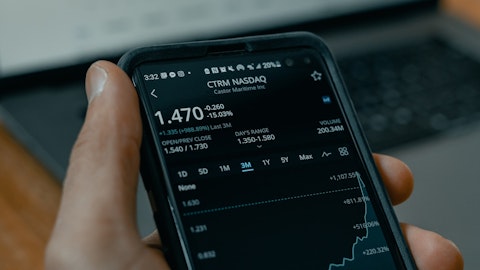Ryan Lynch: The other one I had, you mentioned portfolio monitoring being a big competitive advantage for Ares versus some others. And I do believe that you guys do have a more robust and deeper portfolio monitoring team. I’m just curious, can you maybe help me understand why that is a competitive advantage that if you have a business which is potentially going to come under stress because of the economic environment they’re in. What can that portfolio monitor team actually go in and do that can actually create better outcomes versus a different platform who maybe isn’t able to get as early or maybe be creative in their solutions?
Kipp DeVeer: Yes. I mean I think it’s — we could go on and on about this, to be honest, for a while, but I’ll try not to. I mean I think our philosophy, and Kort mentioned this, too, is we want to bring substantial flexible capital solutions into the companies that we onboard into the portfolio. The way that we underwrite and the way that we approach our transactions is a lead investor helps us, right, because we’re a substantial source of capital, we have direct relationships with either private equity firms and/or companies and/or management teams, where I think we’re viewed as a valued partner rather than just money. And that value partnership transitions all the way through post closing and in the monitoring stage. So I would say it’s pretty easy on the companies that are performing well, right?
In the LBO lending business, club financial statements, you don’t do much and you celebrate the fact that the company is performing at plan or better. In the underperformers, we’re able to actually leverage the nature of that underwriting the nature of that relationship, et cetera, to be very early, right? We try not to be surprised. Our management teams and the owners of companies where we’re invested typically don’t want us to be surprised, right? So when things are not performing to plan, we tend to be in the room. We have quality information we can often provide other portfolio company data and information in existing industries where we’re particularly deep to help management teams understand some of the complexities that they may be experiencing.
But it really is all about that early intervention, seeing the early warning signs and good communication. How can we help? We can help in a whole host of different ways. We can provide amendments and modifications. We can change the nature of the loans that we’ve underwritten because we have the flexibility to do that. We can bring capital to the table if it’s needed in situations where liquidity is less than optimal. Hopefully, that gives you a flavor for it, Ray, but we go on quite a while about that.
Operator: The next question today comes from the line of Casey Alexander from Compass Point.
Casey Alexander: First of all, welcome to the new team members. Congratulations on your assignment to Ares Capital. Most of my questions have been asked. I just wondered the amendments and modifications that you do, they drive a certain amount of fee income. Does that show up also in capital structuring and servicing fees? And would we expect that to sort of impact the level of capital structure and servicing fees in 2023?
Kipp DeVeer: Yes. I appreciate those comments around Kort and Jana. The amendment fees do show up in the structuring fees line, again, with the…
Penelope Roll: Other income line.





